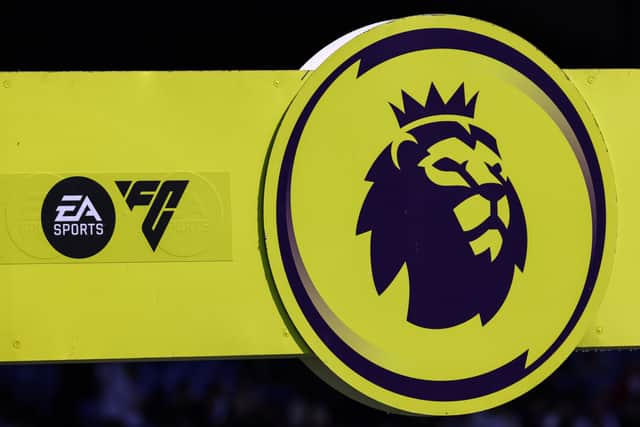EA FC 24 - Gamers on Ultimate Team spending addiction from desire to pack Man Utd, Liverpool and Arsenal stars
and live on Freeview channel 276
Last year, EA Sports' FIFA 23 topped the Christmas gaming charts with a huge 67% rise in sales the week preceding the big day. There's no doubt that as parents hit the shops, and Father Christmas fires up the reindeer, many gamers of all ages will be hoping for the new EA FC 24 is under the tree.
Every month eight million people play the ever-evolving EA hit which has gone through major evolutions since its release in 1993. One of those major steps forward has been the introduction of Ultimate Team. The platform allows users to build their own club and buy their own players - both with in-game coins and real cash.
Advertisement
Hide AdAdvertisement
Hide AdOne way to do this is via EA FC packs, which cost between approximately 75p and £3.99 in real money in EA FC 24. Gamers buy these packs and receive a random selection of players and items, which are only unveiled after the money has been spent. For some users, this function comes with serious consequences.
In recent years, gamers have come forward to speak of becoming addicted to in-game spending and to warn against the use of 'loot box' gambling on FIFA packs.
One Mumsnet user claimed that her son had poured £6,000 into the game during lockdown. When she found out, the 13-year-old is said to have admitted an inability to stop and spent a weekend in tears having 'broken the family'. In 2019, the BBC spoke to a Hampshire parent whose four children under 10 spent £550 on the game having seen him input his card. The dad said the youngsters 'had not understood the impact of what they were doing'.
More recently, EA FC trader SAF Cal shared his story online. Traders provide expertise on the in-game market and SAF Cal has racked up over 278,000 followers in doing so. Taking to X in July, SAF Cal opened up about an addiction to buying FIFA Points in the game with four million users seeing his post. Providing advice to a follower, the trader wrote: "Whilst FIFA Points aren't seen legally as gambling, there's a good chance that you still experience the same highs and lows that you'll have encountered from betting. As addicts, we chase those highs without sometimes realising how destructive and costly the chase is.


Advertisement
Hide AdAdvertisement
Hide Ad"Personally I believe change is needed, FIFA Points can be fun, in the same way a scratchcard can be fun, but unlike with other forms of gambling there's no protective legislation to help identify addicts from spiralling out of control and spending money that they don't have."
Some countries are clamping down on the existence of these packs in the game. Earlier this year, the packs were ruled as a form of gambling by an Austrian court after several FIFA players sued Sony in 2020 - among whom a minor who 'gambled away' €400 on FIFA Packs.
Austrian litigation financiers Padronus stated that over 1,000 FIFA players had contacted the company to make claims with an average of €800 and a maximum of €85,000. The loot box system was deemed to violate the Austrian Gaming Act due to the possibility of items received being worth more or less than the value of the pack itself, hence the potential of a 'financial benefit'.
In the UK, the Gambling Commission identified loot boxes such as EA FC packs as 'a potential risk to children and young people', but they are not classed as gambling. The Commission confronted 'much interest in loot boxes' with a statement from Gambling Commission Executive Director Tim Miller in 2017.
Advertisement
Hide AdAdvertisement
Hide AdMiller explained: "A key factor in deciding if that line [gambling law] has been crossed is whether in-game items acquired ‘via a game of chance’ can be considered money or money’s worth. In practical terms, this means that where in-game items obtained via loot boxes are confined for use within the game and cannot be cashed out it is unlikely to be caught as a licensable gambling activity."
The Commission went on to address worried parents, admitting to be 'concerned with the growth in examples where the line between video gaming and gambling is becoming increasingly blurred'. Unable to classify the function as illegal, the public body called on companies like EA to introduce measures to protect young gamers.
Mr Miller wrote: "Where a product does not meet that test to be classed as gambling but could potentially cause harm to children, parents will undoubtedly expect proper protections to be put in place by those that create, sell and regulate those products."
3AddedMinutes spoke to Mark Griffiths, a Nottingham Trent University professor who is Director of the International Gaming Research Unit, on the matter of loot boxes existing in EA FC 24. For the Professor, 'loot boxes fulfil the definitions of gambling'. He said: "The Gambling Commission say that every time somebody buys a pack they are getting something for their money but the point is, players aren't buying these packs to get rubbish players, they are trying to get premium players which is very hard so they buy pack after pack.
Advertisement
Hide AdAdvertisement
Hide Ad"In the true gambling world, that would be called a loss disguised as a win. If you put £10 on something and you win £8, the point is you lost £2 even if you might have won something."
Professor Griffiths added that while there are far more people who spend money on the game that don't develop problematic behaviour than those who do, a recent systematic review made it 'clear that loot box buying is very much associated with gambling problems'. However, for the academic, spending too much money on the game is likely more a 'problematic behaviour' than meeting the clinical symptoms of what makes an addiction.
He said: "It's something I've been banging on about for decades - the blurring of the lines from gambling to gaming and loot boxes are the most classic example I've got. The gambling industry has always been masters of watering down the value of your money. When you go into a casino you're playing with chips, not money. When you play a slot machine, it turns it into credits. When you play online, you play with virtual money.
"We know the younger you start gambling, the more likely you are to develop problems. If we do class it as gambling, then only adults should be able to do it. I have no problem with an age ban of 18 for the buying of loot boxes."


Advertisement
Hide AdAdvertisement
Hide AdOne EA FC player who fell into a spending spiral on the game shared those worries with 3AddedMinutes and called for an age limit or, failing that, the need for parental authorisation or easier spending limits - the latter can currently be set up via EA Account settings.
Aidan Stephenson poured £13,000 into FIFA Points over four years at university, leaving himself in huge debt. The gamer shared how as a 12-year-old he would spend pocket money on Microsoft Points at Blockbuster to splurge on the game. He said: "Back then it wasn't direct, you wouldn't go to FIFA, you'd go get the Microsoft Points and convert them. There was a few extra steps so it didn't seem quite as dangerous as it is now."
Aidan, who grew up in care, explained how the behaviour grew in his teenage years and admitted he was 'embarrassed' to admit how much he was spending to anyone. He said: "One of the memories I have was in second year, everyone went home for Christmas and I was in this big eight-bedroom house by myself.
"It was Team of the Year, one of the biggest promos in FIFA, and I remember saying to myself, I'd just load £72. Half an hour later, I'd conned myself to spend around £500 in one night. It was so easy to do because there was no one there to say no. It's made so, so easy."
Advertisement
Hide AdAdvertisement
Hide AdAidan shared that he was 'not ashamed' to say he was addicted and that it was only when moving into full-time employment and not having parents' finances to fall back on that a realisation of how much he had spent hit home. The graduate avoided serious financial struggles but did spend 'a few years' clearing the debt he had racked up.
Waldy is another online EA FC trader who looked into the use of FIFA Points by 1,200 gamers earlier this year. Findings showed that 88% of FIFA gamers had purchased the points with 22% of those under the age of 18.
Over a quarter of respondents admitted to overspending or developing an addiction with one in eight of that group reported to be under 18. Overall, 87% of respondents said they viewed FIFA Points as gambling with 78% of people believing only those over 18 should have access to spending real money in-game.
Waldy told 3AddedMinutes: "I thought it [the findings] would be bad, but around one in four people saying they were at one point addicted is insane. EA promote new packs and new content daily, people feel almost obliged to spend money to keep up. With a game like FIFA that can get so easily frustrating, people want an advantage at any cost."


Advertisement
Hide AdAdvertisement
Hide AdWhen approached for comment, an EA spokesperson said: "Our approach to game design is founded in providing players experiences that offer choice, fun, fairness and value, and we believe that optional in-game purchases, when done right, play an important role in giving players a choice in how they want to engage with a game.
"In all our games, spending is always optional, and most players choose not to spend at all. We will continue to provide as much information and control as possible to players and parents to ensure positive experiences, including enabling parents to make informed decisions for their children related to in-game spending."
Electronic Arts also encourages parents to use parental control available across platforms on EA Sports FC and the company invests in awareness campaigns to ensure parents and guardians are aware of the tools available. EA has participated in research into well being around video games and points to work by Dr Pete Etchells which warns against 'moral panic' around loot box research. EA reaffirmed its belief that loot boxes are not a form of gambling.
Comment Guidelines
National World encourages reader discussion on our stories. User feedback, insights and back-and-forth exchanges add a rich layer of context to reporting. Please review our Community Guidelines before commenting.